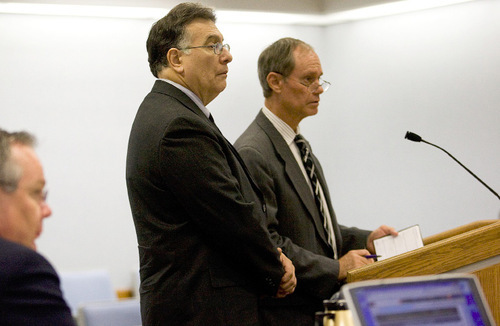This is an archived article that was published on sltrib.com in 2011, and information in the article may be outdated. It is provided only for personal research purposes and may not be reprinted.
Layton • The case of a pest exterminator accused of applying a deadly poison that killed two Layton girls in February is headed to trial in the spring.
Second District Judge Robert J. Dale granted Coleman Nocks' request for a jury trial beginning May 16.
Nocks is charged with negligent homicide in the deaths of Rebecca Toone, 4, and her 15-month-old sister Rachel. They died a few days after Nocks used a pesticide called Fumitoxin to get rid of field mice around the Toone family's Layton home 11 months ago.
Brenda and Nathan Toone, the girls' parents, watched Tuesday's brief court hearing but spoke neither during the hearing nor afterward with reporters. Nocks, of Bountiful, also did not comment.
The former pesticide technician — whose state license was stripped last summer — has said in recent days that his actions did not cause the girls' deaths. But assistant Layton City Attorney Steve Garside said he is "confident" the evidence will show otherwise during the scheduled six-day trial.
"A lot of people don't recognize the complexity of these investigations," said Garside. "The investigation is continuing even today."
He added that the physical evidence in this case points to phosphine, the deadly gas created by Fumitoxin, being to blame in the deaths. Also backing up the city's case against Nocks will be the findings of State Medical Examiner Todd C. Grey.
"We're confident," said Garside, "that his testimony will support our position in this case."
The prosecutor also said the Toones have been supportive about the case, and he called them "forgiving and magnanimous" from the start.
Last weekend, Nocks, 63, said he has lined up three expert witnesses — one on carbon monoxide, one on toxic poisons and a forensic pathologist. The former employee of Bugman Pest and Lawn has hinted that carbon monoxide levels were high in the home — enough to trigger the detector — and in the girls' bodies.
But Garside dismissed that as Nocks' "interpretation" of the evidence.
In Utah, pesticide applicators are licensed by the state under a training and certification program administered by the Utah Department of Agriculture and Food. Nocks was properly licensed at the time to use Fumitoxin, which is a restricted use pesticide.
Investigators allege that Nocks used too much Fumitoxin and placed it too close to the home.
Since the Layton poisonings, the U.S. Environmental Protection Agency has further tightened the use of Fumitoxin. It is no longer permitted for use in residential areas.





